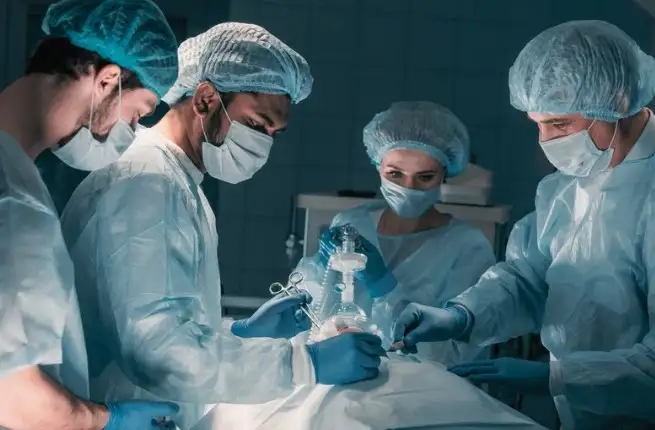These days, finding and retaining skilled CRNAs (Certified Registered Nurse Anesthetists) is increasingly a make-or-break issue for healthcare leaders.
Demand is going up fast, supply is stretched thin, and HR or recruiting teams who get this wrong can run into surgical delays, staff burnout, and patient safety. Here’s what the numbers show:
- CRNA/nurse anesthesiologist employment is expected to grow by nearly 38% between 2022 and 2032, much faster than average for most healthcare roles
- There are currently about 65,745 active CRNAs in the U.S., many of whom are working in rural areas where CRNAs make up over 80% of anesthesia providers
- The field is facing a projected shortfall of approximately 12,500 CRNAs by 2033, which would be nearly 22% of today’s provider base
- CRNAs administer over 50 million anesthetics annually, which highlights their critical role in surgeries, obstetrics, trauma, and rural health services
These trends mean HR leaders, clinical directors, and recruiting teams can’t afford to rely on generic staffing tactics. Every hire, every workflow, and every recruiting partner has to be especially sharp.
In this article, you’re going to get a lineup of the top CRNA staffing & recruiting firms and exactly how they can help you close gaps, speed up hiring, and bring in CRNAs who deliver clinically and culturally.
What Is a CRNA Staffing & Recruiting Firm?
A CRNA staffing and recruiting firm is a specialized partner that helps healthcare organizations find and hire Certified Registered Nurse Anesthetists. Unlike general staffing agencies, these firms focus specifically on anesthesia, which means they understand the credentialing, compliance, and scheduling nuances that come with hiring CRNAs.
For hiring managers, HR leaders, and medical directors, this means you don’t have to spend weeks combing through résumés or juggling credentialing paperwork. A CRNA recruiting firm maintains an active network of qualified providers, which often includes both job-seeking candidates and “passive” CRNAs who are open to new roles if the fit is right.
These firms support a wide range of needs: filling permanent positions, providing locum tenens or PRN coverage during vacations and staffing shortages, and even helping facilities build long-term staffing strategies to reduce burnout and rely less on last-minute fixes. The best partners also take on credentialing, licensing, background checks, and scheduling so your team can stay focused on delivering quality patient care.
Who Uses CRNA Staffing Firms?
- Hospitals and health systems that need stable CRNA teams for OR coverage, obstetrics, pain management, and more
- Ambulatory surgery centers (ASCs) that experience fluctuating case volumes and need flexible coverage
- Specialty clinics (e.g., pain management, orthopedics, GI, dental) that rely on anesthesia providers but don’t always have full-time needs
- HR and recruiting teams looking to cut hiring timelines and secure vetted talent without overloading internal resources
A CRNA staffing and recruiting firm acts as an extension of your HR and medical staff office. They bring you vetted talent faster, with less administrative hassle, and with a sharper focus on fit and retention.
Benefits of Working with a CRNA Staffing & Recruiting Firm
Hiring CRNAs has never been easy, and it’s only getting tougher. Demand is rising, retirements are accelerating, and competition between hospitals, ASCs, and outpatient centers means the best providers are rarely “on the market” for long. That’s where a specialized CRNA staffing and recruiting partner comes in. Here’s how the right firm helps leaders like you build stronger anesthesia teams, faster:
1. Faster hires, fewer gaps
Vacant anesthesia roles cost money and delay patient care. Top recruiting firms maintain active pipelines of pre-vetted CRNAs, so instead of starting every search from scratch, they can connect you with qualified providers quickly.
Our team delivers 80% placement success within as little as 55 days for CRNA requests, reducing vacancy periods by weeks.
2. Access to hard-to-find talent
Many of the best CRNAs are working but open to the right opportunity. Recruiters with anesthesia expertise know how to reach these “passive” candidates and bring them to the table, which gives your facility a competitive edge.
Besides, the Bureau of Labor Statistics projects 9% job growth for CRNAs between 2024 and 2034, suggesting increased competition for talent.
Alpha Apex Group Health has dedicated anesthesia pipelines, though. We maintain relationships with both active and passive CRNAs to help clients avoid bidding wars.
3. Flexible coverage options
Whether you need short-term locums to cover vacations, PRN providers for high-volume days, or a permanent hire to reduce over-reliance on temporary staffing, CRNA recruiting firms offer multiple solutions.
In fact, many of our clients tag locum assignments before converting to full-time, leveraging flexibility without losing institutional memory.
4. Credentialing and compliance handled for you
Managing licensing, background checks, and privileging is resource-intensive. The right firm handles credentialing, compliance, and documentation on your behalf, which can save your HR and medical staff teams hours of work and reduce the risk of expensive mistakes.
Credentialing errors are common: some sources claim that even up to 85% of applications contain missing or inaccurate data that can delay onboarding. However, AAG Health uses internal audits and direct payer enrollment tracking to ensure CRNAs are credentialed and ready to bill from day one.
5. Better cultural and clinical fit
You need CRNAs who mesh with your team, workflow, and patient population. Specialist recruiters take the time to understand your facility’s culture and requirements, which means higher-quality matches and lower turnover.
At AAG Health, we back every CRNA placement by a 90-day replacement guarantee. That way, you have peace of mind that even in the rare cases that the fit isn’t right, coverage continuity won’t be compromised.
6. Cost control and reduced burnout
Overtime pay, last-minute locum bookings, and clinician burnout from understaffing all drive costs higher. By providing timely coverage and permanent hires, CRNA recruiting firms help stabilize workloads, improve retention, and ultimately reduce financial strain.
Even better, AAGH clients report 50–70% cost savings compared to traditional locum models, thanks to flexible scheduling structures that avoid expensive last-minute bookings.
7. Strategic workforce planning
The best firms can actively help you prepare for tomorrow. From anticipating retirements to building a pipeline of leadership-ready CRNAs, recruiters can be a strategic partner in your long-term anesthesia staffing plan.
The numbers don’t look so good.
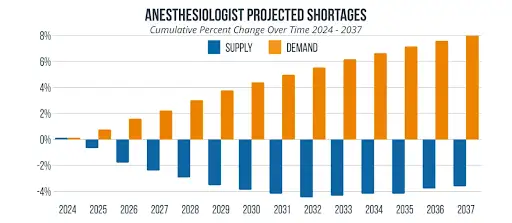
For instance, the U.S. is projected to face a shortage of 8,450 anesthesiologists by 2037, intensifying demand for CRNAs in many systems.
That’s why, at AAG Health, we map retirement and procedural volume trends to help clients budget and recruit proactively.
TL;DR Top 5 CRNA Staffing & Recruiting Firms
- AAG Health: AAG delivers fully credentialed CRNA resumes within 72 hours, and handles compliance end-to-end. We have a candidate placement success rate of 80%, cost savings of up to 70%, and average time to fill up to 55% lower than the industry average.
- Barton Associates: Barton offers locum CRNA staffing with a deep bench of highly experienced providers, and takes care of all logistics so your ORs stay open even on short notice
- Odell Medical Search: Odell’s CPC-certified recruiters match subspecialty-trained CRNAs to your exact case mix so you get the right provider with the right credentials from day one
- KTE Services: KTE combines broad anesthesia specialty coverage with local market expertise, which reduces delays from state-by-state credentialing and improves retention through cultural fit
- Accio Search Group: Accio focuses solely on permanent CRNA hires, with a 90-day guarantee so you can build stable anesthesia teams and cut reliance on locums
Top 10 CRNA Staffing & Recruiting Firms
The best CRNA staffing and recruiting firms on the market include AAG Health, Barton Associates, and CRNA together. This section looks at their services to see how they compare:
1. AAG Health
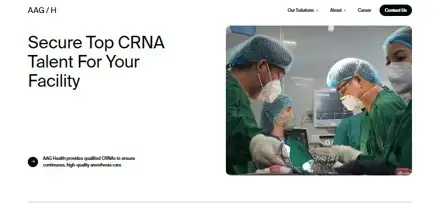
AAG Health is a specialized CRNA staffing firm that helps hospitals, surgical centers, and outpatient facilities solve one of their biggest clinical bottlenecks: anesthesia coverage.
Our model is built around rapid deployment and compliance-first execution. When a client submits a staffing request, AAG Health taps into its active bench of CRNAs who are already credentialed, licensed, and cleared for placement. We also have a proprietary platform that produces over 400 inquiries every day.
Our team handles primary source verification, confirms state and DEA requirements, and manages all credentialing paperwork upfront so providers are fully compliant before they arrive on-site.
For HR teams and department leaders, this means you’re not stuck chasing missing documents or waiting for credentialing lags to clear. AAG also prioritizes speed: we begin candidate outreach within 24 hours of intake, and most clients receive viable profiles within 2–4 business days.
In fact, we use proprietary audits to map your internal culture and make sure the CRNAs we pick fit well with your team. Our results speak for themselves. You can expect:
- Over 80% candidate placement success rate
- 90-day replacement guarantee
- 50-70% cost savings
- High retention rates
Whether you need temporary coverage for an unexpected absence or long-term support to stabilize your OR schedule, AAG Health can scale up or down based on caseload. And because we specialize in anesthesia, our recruiters understand the clinical context and can match CRNAs to your patient acuity, case mix, and facility type.
Bonus: we’re a member of the American Staffing Association (ASA).
Key Services
- Sourcing and placement of experienced, licensed CRNAs
- End-to-end credentialing support, including state licensure, DEA verification, and primary source documentation
- 24–48 hour response time on urgent staffing needs
- Flexible staffing options: short-term, long-term, or permanent
- Cost-alignment strategies based on facility size, case volume, and region
Why Work with AAG Health
We streamline the entire staffing and credentialing process, so you get fully vetted CRNAs fast, without tying up internal HR or compliance resources.
2. Barton Associates
.webp)
Barton Associates is a locum tenens specialist that connects healthcare facilities with CRNAs for temporary or fill‑in coverage… anything from a few shifts to multi‑month assignments.
When a facility has a gap due to a vacation, unexpected departure, or surge in cases, Barton steps in. Once you submit your requirements, they match you with CRNAs from their large, vetted network who meet the clinical specialty, experience, and licensure needs. They manage licensing, credentialing, insurance, travel, and logistical issues so that the CRNA is ready to work on day one.
Because most of their clinicians have 15+ years of experience, facilities often see reduced ramp‑up time and better clinical judgment in complex cases.
They also offer urgency and flexibility: if you need coverage fast, Barton is set up to respond quickly to short‑notice assignments. Since they focus solely on locum staffing across many specialties (including anesthesia), their systems and teams are optimized for speed and reliability for HR/staffing leaders.
That means less OR downtime, fewer cancelled procedures, and less burden on internal recruiting and credentialing.
Key Services
- Locum tenens CRNA placements of any duration, from a few days/shifts to several months or longer
- Matching from a large, experienced, and regularly‑updated network of CRNAs, many with more than 15 years of clinical service
- Full credentialing, licensing, insurance, travel, and housing logistics handled end‑to‑end
- Dedicated account manager for each facility to manage candidate screening, reference checks, and coordination between facility and provider
- Rapid turnaround for urgent staffing needs, often filling gaps quickly after initial request
Why Work with Barton Associates
Barton offers a complete “turnkey” locum CRNA solution, with deep provider experience and logistics handled for you, to help you restore coverage fast without overloading your internal teams.
3. Odell Medical Search
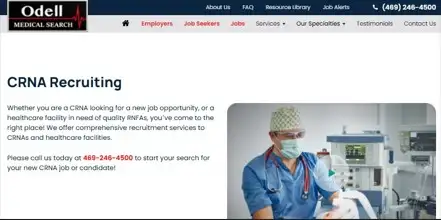
Odell Medical Search is a healthcare recruiting firm that places CRNAs in hospitals, surgery centers, outpatient facilities, and ambulatory surgery centres.
When a facility needs a CRNA (across a range of specialties like orthopedic, cardiothoracic, general surgery, pain management, and L&D), Odell works by first defining the exact clinical and operational needs, like their case mix, experience, subspecialty, and licensing and credentialing requirements.
Their recruiters are majority‑Certified Personnel Consultants (CPC) under the National Association of Personnel Services, which means they follow a standardized, ethical, and transparent process. They maintain large candidate sourcing channels plus confidential job search services for CRNAs, so you know they understand both the candidate’s goals and the facility’s expectations.
What makes this relevant for HR leaders and clinical directors is that Odell doesn't just send resumes.
Much like Alpha Apex Group Health, they carry out deep candidate screening and reference checking, match subspecialty experience, and ensure clinical, licensing, and credentialing alignment before client presentation. They also help cut down the time between approval of a hire and actual OR coverage.
Key Services
- Recruitment of CRNAs across many anesthesia subspecialties: orthopedic, cardiothoracic surgery, pain management, gynecologic, vascular, etc.
- Client‑side placement services: helping facilities find CRNAs whose experience, licensure, and credentials align with both facility type and case volume
- Confidential job search/resume services for CRNAs, allowing candidates to explore options without public exposure
- Recruiters certified (CPC/NAPS), implying adherence to ethics and professionalism in candidate/client relationships
- Detailed candidate vetting: in‑depth interviews, reference checks, verification of clinical specialties, licensure/licensing board compliance, before forwarding candidates
- Support for both sides: they represent employers and CRNAs, so get insight into candidate motivations and facility constraints (which helps matchmaking quality)
Why Work with Odell Medical Search
They combine certified professionalism (CPC/NAPS) with subspecialty expertise across anesthesia types, which gives facilities a better‑matched CRNA who is pre‑vetted in specialty, credentials, and readiness.
4. KTE Service
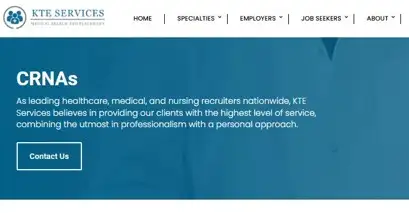
KTE Services is a national medical staffing agency that specializes in placing CRNAs in both locum‑tenens (temporary) and permanent roles across anesthesia subfields like cardiac, pediatric, general, pain management, and outpatient work.
When a hospital or outpatient facility works with KTE, the process begins with a diagnostic intake where they define the facility’s case mix (e.g., high acuity vs routine), required credentialing/licensure, geographic constraints, and desired experience or specialization.
KTE’s recruiters then search their internal and partner CRNA networks and cross-check specialty experience and licensure. They support the full logistics of placement: credential verification, licensing, onboarding, travel (if needed), and employer‑side orientation.
On the candidate side, they advise CRNAs on workplace culture, scheduling expectations, and contract comparisons so hires are less likely to leave early.
Because CRNA demand is growing so quickly, facilities need partners who can move fast and get the match right. KTE’s regional presence in key states (NY, NJ, Philadelphia, Florida, Texas, etc.) means they already understand regulatory/licensing and reimbursement quirks in those areas, which lowers the risk of delays from unfamiliar state requirements.
Of course, other agencies in this review, such as Alpha Apex Group Health, also offer coverage across the 50 US states.
Key Services
- Matching CRNAs to roles across anesthesia specialties: general, cardiac, pediatric, outpatient procedural, pain management, etc.
- Placement services for both temporary/locum tenens assignments and permanent hires
- Regional coverage in high‑demand areas (e.g., NY/NJ, Florida, Texas, etc.), with knowledge of local credentialing, licensing, and facility standards
- Personalized recruiter support: helping CRNAs and facilities assess cultural fit, schedule expectations, and facility workflows
- Full logistics support: verification of credentials, licensure, onboarding, and travel or relocation where needed
Why work with KTE Services
KTE’s strength is in combining broad specialty matching with deep regional know‑how and hands‑on support, so your procedural schedule won’t stall because of licensing, cultural mismatch, or avoidable turnover.
5. Accio Search Group
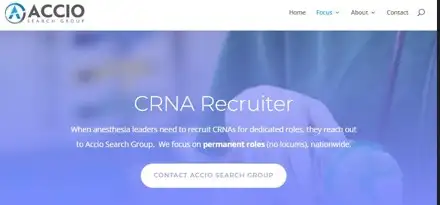
Accio Search Group is a recruiting firm that focuses solely on permanent Certified Registered Nurse Anesthetist (CRNA) placements; they do not do locum/ temporary staffing.
When a facility has a vacant CRNA position, Accio kicks off with a detailed alignment of what “urgent role” means for that client: clinical specialty (e.g., general, cardiac, pediatric), required credentials, experience level, licensure, and expectations around scheduling, culture, and facility type.
As you can see, this is the typical process that most good agencies follow. As a bonus, AAG Health runs proprietary audits and has thought leaders who produce original research. This internal data helps us find a better fit for your company, faster.
Now, back to Accio Search Group.
Their recruiters extract passive CRNA candidates through their built network. They do targeted outreach instead of relying on job boards. All vetting includes verifying licenses, checking references, and matching the candidate’s subspecialty experience and professional motivations with the facility’s environment.
They guarantee placements, too. Just like AAG Health, Accio offers a 90-day guarantee period to address mismatches early, and they aim to shorten hiring cycles by around 50% compared to typical searches.
For HR teams and clinical leadership, this matters because permanent CRNAs reduce overtime, avoid premium locum costs, improve continuity of care, and help build team stability. Accio’s approach means you’re less likely to deal with sudden staffing gaps, burnout from repeated temporary cover, or disruption to patient care.
Key Services
- Permanent CRNA recruitment (no locum/temporary assignments)
- Placement of senior/leadership CRNA roles (Chief CRNA, CRNA Director)
- Passive candidate pipeline development (identifying CRNAs open to permanent roles, even if not actively searching)
- Detailed candidate vetting: licensure verification, reference checks, specialty alignment, motivation/fit assessment
- 90-day guarantee on placements to mitigate early turnover or mismatches
Why work with Accio Search Group
Accio’s USP is that they build permanent anesthesia teams by combining a deep, passive talent network with a fast, guarantee-backed placement process, so you fix persistent CRNA staffing issues without endless locum reliance or hiring delays.
6. CRNA Locum Job
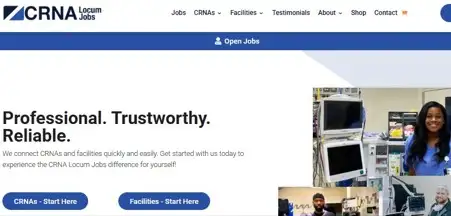
CRNA Locum Jobs is a locum tenens (temporary/fill-in) staffing service created by CRNAs for CRNAs. When a facility needs immediate anesthesia coverage, whether due to staff absence, case surges, or remote/RR outpatient needs, CRNA Locum Jobs offers a direct match with providers who already understand the demands of the field.
Because the company is owned and operated by active CRNAs, they deeply understand what fair compensation is, what case-mix expectations look like, and what facility logistics tend to trip people up.
CRNA Locum Jobs handles candidate matching, verifies credentialing and licenses, and negotiates rate structures (to try to get better pay terms than large agencies usually do).
Their smaller size and lower overhead mean they can deliver faster responses and more favorable rate splits.
To put their role in context: according to SullivanCotter’s 2024 compensation survey, median total cash compensation (TCC) for CRNAs rose by 9.6% from 2022 to 2023, which reflects demand pressure and rising expectations around pay.
Key Services
- Matching facilities with CRNAs for locum assignments (short-term coverage, shift/fill-ins)
- Credentialing and licensing verification for CRNAs to ensure compliance before deployment
- Rate negotiation: working to secure fair compensation by leveraging their CRNA-owned status and lower agency overhead
- Transparent, personalized communication about assignment details (case mix, travel, lodging, hours, call requirements)
- Smaller agency advantages: faster responses, less bureaucracy, more direct contact between provider and agency
Why work with CRNA Locum Jobs
If your priority as an HR leader or anesthesia director is fast, transparent fill-ins with fair pricing and minimal administrative drag, CRNA Locum Jobs stands out. Since they’re run by CRNAs themselves, they bring both marketplace empathy and lean overhead.
7. Recruiting Resources
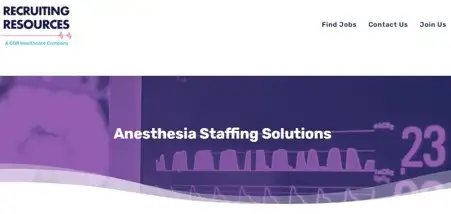
Recruiting Resources focuses exclusively on anesthesia staffing, connecting hospitals, surgery centers, and clinics with both locum and permanent CRNA talent. This agency aims to solve two of the biggest headaches for healthcare leaders: filling urgent coverage gaps and reducing long-term staffing strain.
The firm taps into a wide national network of anesthesia providers and matches facilities with CRNAs who have the right experience for the case mix, whether that’s general surgery, obstetrics, or specialty procedures.
For HR teams, this means you’re not sorting through mismatched applicants; Recruiting Resources handles the vetting and makes sure that credentialing is complete before a provider arrives on site.
One differentiator is their deep experience in locum tenens anesthesia. They position locums as a major strategic advantage. Recruiting Resources helps facilities adapt staffing levels without locking into long-term overhead, while still maintaining quality of care.
Key Services
- Locum tenens anesthesia staffing (CRNAs and anesthesiologists) for short- or long-term assignments
- Permanent CRNA recruitment for hospitals, surgery centers, and specialty clinics
- End-to-end support: credentialing, licensing, scheduling, and travel logistics
- National network of providers across multiple specialties and facility types
- Ongoing recruiter support before, during, and after assignments
Why work with Recruiting Resources
They bring a dual model (locum and permanent staffing), which is backed by a national anesthesia-only network. For healthcare leaders, that means fewer empty OR schedules, smoother credentialing, and the ability to flex staffing levels without compromising care quality.
8. Harmony Anesthesia Staffing
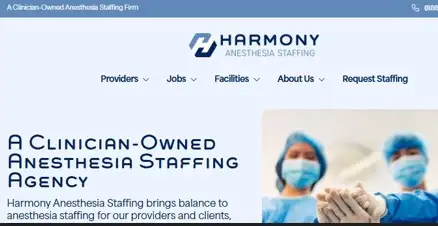
Harmony Anesthesia is a clinician-owned anesthesia staffing agency run by practicing CAAs, CRNAs, and anesthesiologists. They serve hospitals, ASCs, and anesthesia groups across the U.S. with locum tenens, PRN (as-needed), and permanent staffing solutions.
Because the company is run by anesthesia providers, they bring firsthand understanding of what facilities need (case mix, scheduling stability, credentialing) and what providers want (fair compensation, flexibility, transparency).
Here’s how they work in precise terms: when a facility reaches out for coverage, Harmony matches them with providers who are already vetted, licensed, and experienced in the relevant specialties (e.g., general anesthesia, pediatrics, orthopedics, neurosurgery). They handle contract logistics, including travel stipends, reimbursements, and malpractice/tail coverage (in some assignments).
On top of that, Harmony sets a weekly payroll for providers and also offers a 1% year-end profit sharing based on gross pay. For shifts or contracts that are PRN or locum, they require minimums (e.g., daily minimum hours, monthly availability), and maintain transparency in pricing with a values-based “staffing algorithm”.
Key Services
- Locum tenens staffing: 3-6 month contracts (with extension options), with travel stipends, reimbursements, weekly payroll, malpractice/tail insurance
- PRN staffing: providers with flexible scheduling, minimum daily hours, requirement for monthly availability (such as 32 hours/month), and pathway to permanent roles
- Permanent placement: helping facilities hire full-time anesthesiologists, CRNAs, and CAAs with insight into case mix, schedule expectations, facility culture, and compensation
- Provider-friendly perks: year-end 1% profit sharing on gross pay, weekly payroll, travel/reimbursement, clear expectation setting, credentialing coordination
- Transparent & value-based pricing model for facilities: algorithmic approach to staffing rates, minimizing “agency markup” surprises, and aligning cost to actual value delivered
Why work with Harmony Anesthesia Staffing
Harmony stands out because it’s clinician-owned and designed with provider incentives at the core. Weekly payroll and end-of-year profit sharing (1% of gross pay) make Harmony more attractive to CRNAs and anesthesiologists than agencies that delay or cut into earnings.
9. CRNA Together
.webp)
CRNA Together is one of the few staffing firms built solely around CRNAs. They focus on locum tenens and contractor-style “bridge staffing” programs, with assignment lengths that typically run from one to six months or longer.
Their model is designed to give healthcare facilities reliable anesthesia coverage without over-committing to long contracts, while also creating stronger alignment with the CRNAs themselves.
Here’s how it works: CRNA Together provides facilities with credentialed CRNAs who are available for daily coverage needs, ranging from small teams to high-volume OR environments that require 30+ providers.
Unlike many agencies, they operate on a profit-sharing model, which means CRNAs receive a percentage of company profits in addition to their contract pay. This structure incentivizes providers to deliver consistently high-quality care and maintain long-term relationships with the agency.
For hospitals and surgical centers, that translates into access to engaged, motivated CRNAs who are less likely to churn mid-assignment.
Transparency is another key part of the CRNA Together model. They emphasize clear contracts, straightforward accounting, and direct communication between recruiters, providers, and facilities.
Key Services
- Locum / 1099 bridge staffing: Short- to medium-term assignments (1–6+ months) tailored to variable facility demand
- Profit sharing: Eligible CRNAs receive a share of profits, driving stronger alignment and retention
- Transparency: Clear financial practices, contracts, and assignment terms with no hidden surprises
- High-volume capacity: Ability to cover needs ranging from 1–2 CRNAs up to 30–35 daily providers
Why work with CRNA Together
Their profit-sharing model makes CRNAs true stakeholders, thus leading to higher engagement, better retention, and stronger alignment with facility goals. For healthcare leaders, that means fewer staffing gaps and more stability in coverage.
10. Radar Healthcare Providers
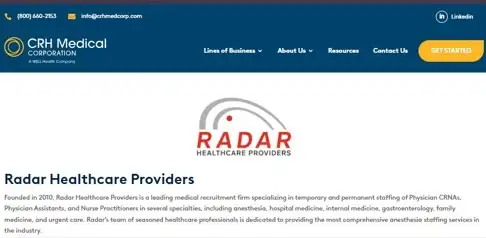
Radar Healthcare Providers specializes in staffing advanced practice providers, including CRNAs, PAs, and NPs, with a strong focus on anesthesia. They support both facilities and clinicians by offering placements across the full spectrum: locum tenens, PRN/part-time, and permanent roles.
On the facility side, Radar handles sourcing and screening providers, aligning credentials, and managing contract details so HR leaders and medical directors can keep their attention on patient care.
Their recruiters care about alignment and making sure the provider’s goals match the facility’s coverage needs, which helps reduce turnover and increase satisfaction on both ends.
Radar is also backed by CRH Medical Corporation (now part of WELL Health Technologies), which provides stability, resources, and reach beyond what many niche staffing firms can offer. That broader infrastructure means faster sourcing, stronger credentialing support, and the ability to scale for larger systems.
Key Services
- Locum tenens staffing for CRNAs, PAs, and NPs to fill short- and mid-term coverage gaps
- Permanent placement services to build long-term anesthesia and advanced practice teams
- PRN and part-time staffing for flexible, cost-effective coverage
- Matching process that aligns provider career goals with facility needs for stronger retention
- Competitive pay and scheduling options to attract top clinical talent
Why work with Radar Healthcare Providers
Radar’s advantage is its breadth of staffing options, including locum, PRN, and permanent, all backed by the resources of a larger healthcare organization. That means facilities can solve immediate coverage needs without losing sight of long-term workforce stability.
How to Choose the Right CRNA Staffing & Recruiting Firm
When it comes to anesthesia coverage, the wrong choice can mean OR delays, compliance headaches, or wasted budget. Here’s what to look for, and what to watch out for, when choosing a CRNA recruiting partner.
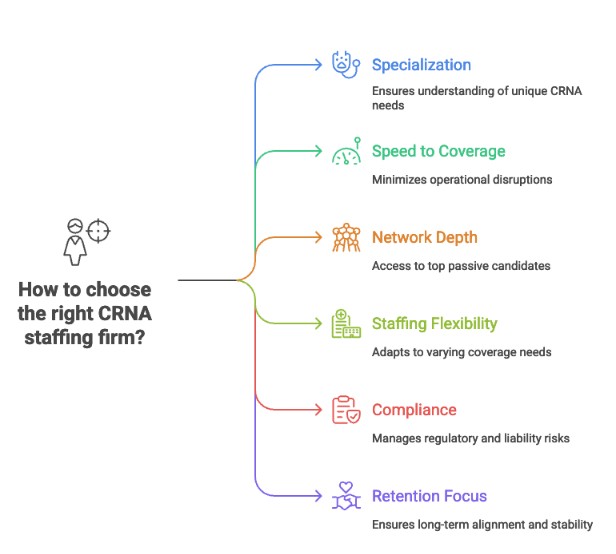
1. Specialization in anesthesia
Firms that work broadly across healthcare may not fully grasp the unique credentialing, compliance, and scheduling demands of CRNAs.
- Red flag: They talk about “nurse staffing” in general, without clear examples of CRNA-specific placements.
- Ask this: “How many CRNAs have you placed in the last 12 months, and in what types of facilities?”
2. Speed to coverage without cutting corners
Vacant anesthesia shifts cost money and disrupt patient care. You need a partner who can deliver talent quickly, but not at the expense of quality.
In fact, the right CRNA partner should show a track record of reducing vacancy times and quantifying the downstream savings. If they can’t connect coverage to OR throughput and revenue protection, they’re missing the point.
- Red flag: They promise fast placement but can’t explain how they vet credentials or maintain compliance.
- Ask this: “What’s your average time-to-fill for CRNA roles, and how do you ensure credentialing is verified before placement?”
3. Network depth and passive candidate access
Top CRNAs often aren’t actively applying to job postings and most CRNAs already employed. What matters is access to passive candidates and hard-to-reach subspecialists (cardiac, pediatrics, pain).
A credible firm should prove they maintain ongoing relationships with these clinicians, instead of starting to hunt after your request. So, ask about their referral networks, proprietary databases, and candidate engagement strategies.
- Red flag: Their sourcing strategy relies mostly on job boards or ads.
- Ask this: “How do you engage passive CRNAs who aren’t actively job-hunting?”
4. Flexibility in staffing models
Hospitals, ASCs, and clinics need different coverage at different times, like permanent hires, locums, or PRN shifts. The right firm adapts, instead of pushing a one-size-fits-all model.
- Red flag: They only offer permanent or only locum tenens, forcing you into contracts that don’t match your needs.
- Ask this: “Do you support both permanent and temporary CRNA staffing, and how do you scale coverage when volumes spike?”
5. Compliance and risk management
CRNA credentialing and privileging can drag out for 90–120 days, and one paperwork misstep means months of OR downtime. A serious staffing partner should have dedicated credentialing teams, audit processes, and payer enrollment support built in. Bonus points if they offer tech-enabled credentialing platforms that speed up verification and reduce errors.
- Red flag: They leave credentialing tasks up to your HR team or can’t show a clear process for verification.
- Ask this: “What’s your credentialing process, and who is responsible for verifying licenses, certifications, and references?”
6. Retention and fit for the long run
The best firms care about long-term alignment, instead of plugging short-term gaps. High turnover drives up costs and creates constant disruptions in care.
After all, each new CRNA must be trained on your anesthesia machines, EMR, and workflows. And every turnover resets that investment.
So, ask firms about their 12-month retention rates, post-placement support, and how they assess cultural fit. A partner focused only on “speed to fill” leaves you stuck in a churn cycle.
- Red flag: They measure success only by how fast they fill roles, not by retention or repeat placements.
- Ask this: “What percentage of your CRNA placements stay beyond the first year?”
Final Thoughts
Filling CRNA roles means protecting revenue, ensuring compliance, and keeping patient care uninterrupted. A strong staffing partner takes that weight off your shoulders by sourcing, credentialing, and connecting with providers who fit your team.
Among the options, AAG Health stands out.
We move faster than most firms, rigorously vet credentials, and offer flexible staffing models tailored to hospitals, ASCs, and outpatient centers. That translates into less downtime, stronger retention, and CRNAs who support clinical outcomes as well as cost control.
Curious to see how we can help? Contact us today to find out.
FAQ: Finding a CRNA Staffing Partner
1. How does working with a CRNA recruitment firm improve talent acquisition?
Recruitment firms that specialize in anesthesia professionals already maintain active networks of qualified CRNAs, so instead of starting every search from scratch, they can connect you to top candidates quickly. This makes talent acquisition faster, more targeted, and less resource-heavy.
2. What should HR leaders expect in the recruitment process for CRNAs?
A strong recruitment process covers sourcing, credentialing, licensure verification, and reference checks before you ever see a candidate profile. This end-to-end support means healthcare professionals arrive fully cleared, so HR teams can focus on interviews and team fit rather than paperwork.
3. How can CRNA staffing partners help improve operational efficiency in hospitals and ASCs?
By reducing time-to-fill and providing credentialed anesthesia professionals on demand, staffing partners prevent OR slowdowns, canceled cases, and costly overtime, which directly boosts operational efficiency and protects revenue.
4. Why use specialized recruitment firms instead of general healthcare staffing agencies?
Specialized firms understand the clinical and regulatory requirements unique to anesthesia professionals, which leads to better candidate matches, higher retention, and smoother onboarding compared to generalist firms that lack this niche expertise.
